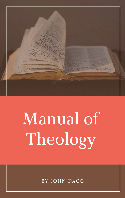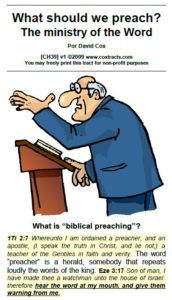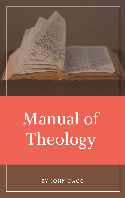Ads
Contents
The Fruit of a False Prophet other gods part 5
The Fruit of a False Prophet other gods part 5
By David Cox
Summary: This study will investigate what the fruit (life and ministry) of a false prophet. Part 5 of this series is simply an introduction, and begins by contrasting a man of God’s fruit (piety and holiness) with the false prophet’s fruit (sin, not doing God’s will).
We should understand what worship is. Worship is what you devote your life to. We are God’s creatures should devote our life to our God. Few people do this, and even few Christians really do this. They want to go to heaven, and they want to have their other gods. You can tell what is a god in their life because (1) they devote most of their time, energy, and resources to that thing. (2) they hold onto it so tightly that giving it up even for a little bit is out of the question. A “god” demands in a person’s life, and this is what being a god is about. The basic concept of the word “god” means that it is a person or thing that demands, commands, or orders a person’s life.
When we look at the fruit of a minister’s life, we need to look at how he personally has carried and executed his life with his God (or god). Personal holiness here is not an option, it is the whole ball of wax. If a minister is not holy because it flows naturally out of the factors of his relationship with God, then he is a false prophet.
Acts 17:11 These were more noble than those in Thessalonica, in that they received the word with all readiness of mind, and searched the scriptures daily, whether those things were so.
Again we see that a daily searching of Scriptures against the things that a person is taught is key in being a true man of God. This makes a very strong belief and visual resorting to the authority of Scripture an essential in a man of God. In any doctrinal differences, or even just straight teaching, we go back to Scripture to see what Scripture says, because our authority is the Word of God.
The Pattern of the People of God
Let me insert here that there is a “pattern” that develops which is the true people of God, with true men of God at their head. This pattern is what is shown to us in the Bible. While the OT dispensation had its own pattern (the people of God in a nation), the NT is what is obligatory for us really. In this, God’s people were saved, receiving Jesus Christ as their Savior because ministers and individual Christians were preaching it to the lost. After receiving Christ, they were baptized by a local church, as an entrance into that local assembly. They congregated there every week on Sunday, and they “did the work of God” through that local church. The work of God is the presentation of the gospel to the lost, going where the lost are, including around the world. From those lost that get saved, they are organized into the local church. They join in doing the work of God there. There were no denominations, and there were nothing like a religious hierarchy (like Catholicism, Jehovah’s Witnesses, nor Mormonism). Each local church was self-governing, self-sufficient, and self-reproducing.
The “Old” versus the “New”
We need to reread that above paragraph and understand it. What is outside of that pattern is probably not of God. Satan presents something “new”, something that is outside of that pattern. There are movements today that say we need to reform the church. We need to change the “old thing” and make something “new”. The Emergent Church idea is that we need to make church more “relevant”. The only reason the church is not relevant today is because those particular ministers are completely without understanding of how the work of God is really done.
1Tim 1:3 As I besought thee to abide still at Ephesus, when I went into Macedonia, that thou mightest charge some that they teach no other doctrine, 1Tim 1:4 Neither give heed to fables and endless genealogies, which minister questions, rather than godly edifying which is in faith: so do. 1Tim 1:20 Of whom is Hymenaeus and Alexander; whom I have delivered unto Satan, that they may learn not to blaspheme.
There is a specific prohibition to look for “new stuff” or “new ways”. We are to stick to the old Gospel, the biblical way of doing God’s work. It still works fine, and only when unsaved people try to do it, does it not work for them.
Satan is constantly trying to get people OFF OF THE BIBLE. He wants them to follow fables and endless genealogies, things that cause conflict, doubt, and questions. God wants us to focus on things that edify our moral character, which builds our faith (trust and confidence) in Christ.
Deut 13:1 If there arise among you a prophet, or a dreamer of dreams, and giveth thee a sign or a wonder, Deut 13:2 And the sign or the wonder come to pass, whereof he spake unto thee, saying, Let us go after other gods, which thou hast not known, and let us serve them; Deut 13:3 Thou shalt not hearken unto the words of that prophet, or that dreamer of dreams: for the LORD your God proveth you, to know whether ye love the LORD your God with all your heart and with all your soul.
The error that Satan throws at us is that there are other things better than the “old ways”, the “old gospel”, that we need to dedicate ourselves to. These other gods (no he doesn’t call them a “god”, but these new things are to take over and control our lives like a god) are what we are to follow. Notice that these false prophets regularly “give a sign or wonder”. The false prophet is worried about “awing”people, making them marvel at the things he is doing. This in itself is not a good sign, but a sign of divergence from God’s path.
The Importance of the Love of the Truth
2Thess 2:10 And with all deceivableness of unrighteousness in them that perish; because they received not the love of the truth, that they might be saved.
Paul identifies a common cause of straying from God’s path as a lack of love of the truth. People who cannot focus on truth as the Bible presents it, and they cannot stick with that truth, seek after it, and wholly put it as the goal of their life, these people just are not saved.
Salvation is dependent on a pursuing of truth. Truth here is not facts. Truth here is moral truth that demands a reception or rejection by the person. “The pen is on the table” is a fact, and it can be true or not true, and it is relevant to the particular table and pen at hand, the time (sometimes it may be true and others it may not be true). But all of that is far from the truth that Paul describes. Truth in Scripture is a moral truth. “A man will marry one woman, and reject all other types of sexual relationships.” This is a moral truth and you have to have a disposition towards it. You either obey it, or you don’t. Even those who are virgins still obey or reject this truth. Many young men fornicate in their minds when they see a pretty girl. They reject the truth.
Embodying Moral Truth in an Example
So this moral truth is what we must seek. Likewise Jesus Christ is this moral truth embodied in a human body, in a human experience. Jesus perfectly fulfilled every detail of the moral pattern that pleases God (is God the Father’s will). What we do not understand is that this is the only way morality is transferred from one person to another.
That is, moral is transferred by principled teaching of a person actually practicing that morality. Principled teaching in this case means a reading and exposition of the actual Word of God. But even though this is good and right, it is negated when a hypocrite teaches it. If a person who smokes gives others a lecture on why we should not smoke, what they learn is hypocrisy. Sure, we should not smoke, but it is alright to smoke anyway, and just tell everybody not to, and talk a lot about it.
When we examine a minister to see if he is a man of God or a false prophet, the most important elements to discern should be (1) his handling and respect for the Word of God, does it saturate his message and life, and (2) whether he personally lives what he preaches. He MUST LIVE IT. If he does a great job at presenting the Word of God, and a lousy job at living it in his personal life, in his marital life, his family life, his life within the church family, then he should not be a minister. He is disqualified.
Moreover, when we see a pastor that on the one hand greatly demands high biblical standards in his people’s life (think sacrifice of time, money, resources, loyalty, devotion, etc), but he himself doesn’t lead them with the personal example of his own life, then he is a false prophet.
Heb 13:7 Acordaos de vuestros pastores, que os hablaron la palabra de Dios; considerad cuál haya sido el resultado de su conducta, e imitad su fe.
There is a very clear imperative to imitate the men of God over you. This is a two way street. First of all, you should imitate them because they are examples of Christ. Secondly you should not be under their ministry if they are not examples of Christ. It is very important to seek intensively if they are examples of Christ, and get away from them quickly if you discern that they are not. Surely there are examples where something happened, and you think this is not right. But most probably, those situations are 1 out of 100 where people stay too long under a false prophet. Remember the false prophet has one desire, to control the people under his hand. That helps a lot in discerning between the good and bad.
Acts 20:29 For I know this, that after my departing shall grievous wolves enter in among you, not sparing the flock. Acts 20:30 Also of your own selves shall men arise, speaking perverse things, to draw away disciples after them. Acts 20:31 Therefore watch, and remember, that by the space of three years I ceased not to warn every one night and day with tears. Acts 20:32 And now, brethren, I commend you to God, and to the word of his grace, which is able to build you up, and to give you an inheritance among all them which are sanctified. Acts 20:33 I have coveted no man’s silver, or gold, or apparel. Acts 20:34 Yea, ye yourselves know, that these hands have ministered unto my necessities, and to them that were with me. Acts 20:35 I have shewed you all things, how that so labouring ye ought to support the weak, and to remember the words of the Lord Jesus, how he said, It is more blessed to give than to receive.
What Paul identifies here is that there are wolves out there, and they are “among us”. They identify with us so perfectly that it is very hard to discern that they are there. One of the elements that identify them is there general lack of mercy. They “spare not the flock”. This means they really have a hard time (though their Public Relations actions would try to hide this), but they have a hard time showing or having mercy on others. They are wolves. They consume others, and they think not of how their consuming really hurts others. In the final analysis, they only think of one thing, how they themselves are benefitted.
Moreover, the great identifier here is that they seek control, and they are experts and very adapt at controlling people. They “drag” people after them. This dragging is actually dragging away from all other good spiritual influences and submitting them to their own control. They do this by speaking “perverse” things or “twisted” things. Their logic is not straight, but rather self serving. While they will preach long and hard on loyalty to them and their organization, they will not go extra mile when you as a member have problems. These things either are passed over leaving you to your own resources, or some lower level person is assigned to help you. Service of God’s people seems to always get lost in their mindset. You cannot be a great famous preacher and clean the bathrooms at the same time. One kills the spirit of the other. They know this, and they work on using people to get their own will done.
See also my tracts
CH24 Power of an example
CH26 “Don’t touch the anointed of God”

Dagg Manual of Theology (and links to this work in various other formats).
Dagg Manual of Theology (MySword for Android)
Dagg Manual of Theology (theWord Bible Format)
Dagg Manual of Theology (esword format)
Dagg Manual of Theology (PDF Format)







